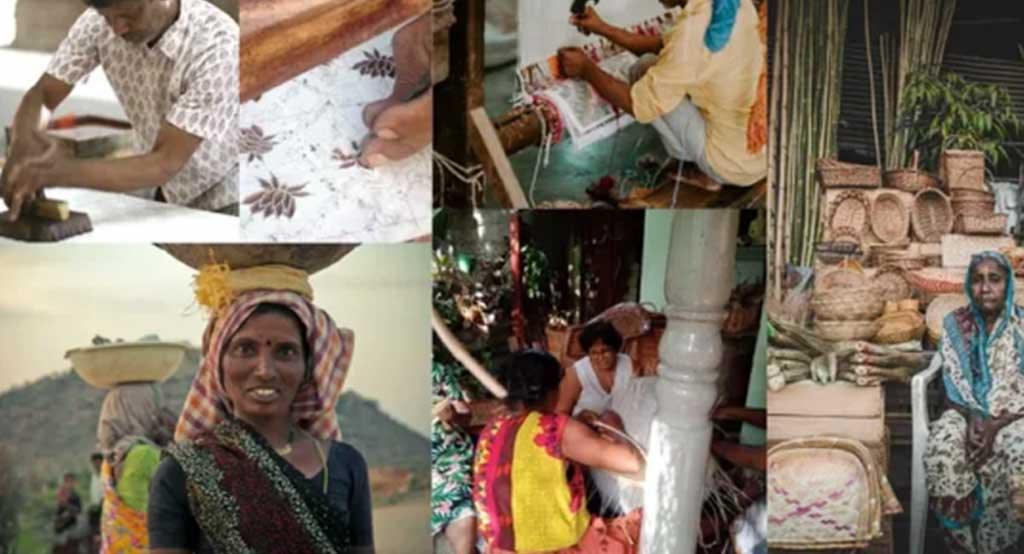
Rural Communities: Why your support matters & How it's a lifeline
Share
I've had the privilege of travelling through many countries including, India, Thailand, Cambodia, Indonesia, Peru, Ecuador, Chile, Greece and Portugal to name a few. Throughout my travels I chose to get close to the culture and the people by visiting less tourist destinations and taking roads less travelled. This allowed me to see beautiful rural and village communities who continue to live a slow, intentional and more harmonious life in sync with the environment around them.
I was exposed to the tremendous beauty of their handicrafts, and the skill and precision of their artistry, which would have taken years to perfect. From hand-block printing to weaving baskets and rugs to stone and wood carving to fine arts painting and intricate embroidery - every piece capturing the soul of the maker.
Each craft carries the strong identity of the community from which it originates. For example, India's hand-block printing, the dyes and patterns used can be specific to different regions of the country, showcasing the beauty from that culture and community. It captures the history of the people who made them and their significance.
The beauty of rural craft based and hand-made products lies in the fact that each item is truly unique and differ slightly from each other. Even though the same technique or ingredients have been used, the variations occur because every hand behind the craft adds their own identity and soul.
It's common to see slight irregularities with hand made products and it is not something to discard or view as a defect but rather, to embrace the uniqueness of this piece.
Why your support matters?
- Supporting traditional crafts provides a source of income to many villages, keeping rural communities alive and employed within their traditional environment.
- The art form can employ entire communities and utilise skill of both the men and women. Income can then be used to sustain the community and educate their children.
- These highly skilled artisans practice traditions hundreds of years old and your choice to purchase these products maintains the valuable knowledge transfer from master craftspeople to students, keeping this beautiful, unique and highly skilled artistry alive.
- Many rural communities and villages have seen families broken up as the young venture to cities in search of employment. Supporting these communities allows families to stay together and earn an income within their community. Our ethical production partner in Sri Lanka advised that the average age of the weavers in a rural community used to be 60 but now it is 50 with their youngest weaver aged 24. This means that they aren’t forced to seek employment outside in bigger cities, leaving behind their families and village and way of life. They are able to sustain a livelihood through weaving and using their artistic skills.
- Offers the ability for women to gain employment and income within the day-to-day routine of family life
- In today's world of machine made and mass produced items, your support enables the uniqueness of these arts to thrive and allows communities to maintain connection with their cultural heritage
- Rural crafts are slow and labour intensive and incorporate sustainable practices.Their environmental impact is minimal
How it can be a lifeline
In today's world of climate change, drought and more recently, impacts of COVID-19, rural, village and remote communities are often hit harder than their urban counterparts.
These communities have less access to opportunity with many being economically deprived. Making and selling traditional crafts and artistry can lift families and communities out of desperation.
A significant benefit of supporting rural communities is the empowerment of women. Considering the challenges faced especially by women in rural areas, such as poverty, low literacy levels and unemployment, traditional handicrafts and artisanal work can empower women so that they can become their own agents of positive change.
2 Profiles of women who weaved our Grass Reed Bags

Lalitha
Born in 1960, Lalitha is the mother of 4 and is a housewife. During her spare time she engages in the weaving reed bags to supplement the income generated by her husband. Weaving bags from her home allows her to support the family financially while now a grandmother looking after her grandchildren, while her children are away at work. She believes in the potential of the handicraft sector in Sri Lanka to help the country generate income and therefore wishes to continue engaging in the sector.
Priyangani
Priyangani is a mother of 3 and a housewife. Born in 1960, she weaves reed bags to supplement the income earned by her husband and help meet the financial needs of her family. She weaves reed bags from home during her spare time and values the flexibility this work gives her. She is keen to promote the traditional craft and often takes part in skill development workshops to train the younger generation. She hopes her grandchildren and their generation will grow to appreciate the beauty of handmade products.
In Conclusion
Supporting rural communities through purchasing their handicraft results in:
- Providing a source of income
- Employment of entire communities
- Maintaining knowledge transfer from master craftspeople to students
- Allowing families to stay together
- The ability for women to gain employment and income
- Enablement of communities to maintain connection to their cultural heritage
- Low environmental impact products brought to consumers
Your support provides a lifeline by:
Helping to lift families and communities out of desperation
Empowering women to become their own agents of positive change





